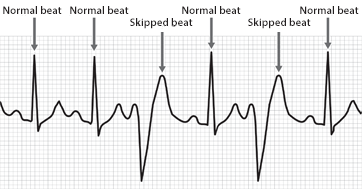High blood pressure, also known as hypertension, is a common condition characterized by elevated blood pressure levels that persist over time. Often referred to as the “silent killer,” hypertension typically presents with few or no noticeable symptoms in its early stages, making it crucial for individuals to monitor their blood pressure regularly and be aware of potential warning signs. Understanding the proper high blood pressure symptoms is thus essential for early detection, diagnosis, and management of this silent but potentially life-threatening condition. So, without further wasting time, let’s dive deep into this article to know the 9 high blood pressure symptoms that are more than enough to let you be aware of this condition.
What is High Blood Pressure?
Before jumping into all the high blood pressure symptoms, let’s take a quick look at how we can define high blood pressure so that you can get a clear idea of it. Blood pressure is the force exerted by the blood against the walls of the arteries as it circulates through the whole body. It is measured using two values: systolic blood pressure (the pressure when the heart contracts) and diastolic blood pressure (the pressure when the heart relaxes between beats). High blood pressure occurs when these values exceed the normal range, typically defined as a systolic pressure of 130 mmHg or higher and/or a diastolic pressure of 80 mmHg or higher.
Also Read: 8 Causes of High Blood Pressure That May Leave You Shocked!
Hypertension is often asymptomatic in its early stages, earning it the nickname “the silent killer.” However, as blood pressure levels rise, some individuals may experience symptoms related to the effects of high blood pressure on the body. That’s why, we have explained all these crucial high blood pressure symptoms that you need to know to stay aware of this silent yet lethal condition!
Headaches
Headaches are a common high blood pressure symptoms particularly during hypertensive crises or sudden spikes in blood pressure levels. These headaches are typically described as pulsating or throbbing sensations, often felt at the back of the head or behind the eyes. While headaches can be a symptom of high blood pressure, they are not specific to hypertension and can occur due to various other factors.

Dizziness and Light-headedness
Elevated blood pressure levels can affect cerebral blood flow and lead to symptoms such as dizziness, light-headedness, and feelings of faintness. Changes in blood pressure when transitioning from sitting to standing or standing for prolonged periods may exacerbate these symptoms. Individuals experiencing frequent episodes of dizziness or light-headedness should monitor their blood pressure and seek medical evaluation to rule out hypertension or other underlying conditions.

Chest Pain
Chest pain, also known as angina, can occur as a result of reduced blood flow to the heart muscle due to narrowed or blocked coronary arteries. While chest pains are commonly associated with heart disease, they can also be high blood pressure symptoms, particularly during hypertensive crises or complications such as hypertensive emergency or aortic dissection. Individuals experiencing chest pain should seek immediate medical attention to rule out serious cardiac events and receive prompt treatment.

Visual Changes
High blood pressure can affect the blood vessels in the eyes, leading to visual disturbances such as blurred vision, double vision, or changes in vision acuity. Retinal changes associated with hypertensive retinopathy, such as arteriolar narrowing, hemorrhages, and exudates, may be detected during eye examinations. Vision changes related to high blood pressure should prompt further evaluation by an eye care professional to assess for potential complications and determine appropriate management.

Fatigue and Weakness
Chronic elevation of blood pressure levels can lead to fatigue, lethargy, and generalized weakness, often attributed to reduced tissue perfusion and impaired oxygen delivery to cells and tissues. Individuals with high blood pressure may experience feelings of tiredness or exhaustion, even after adequate rest or sleep. Thus, it’s one of the very common high blood pressure symptoms. Fatigue and weakness associated with hypertension may significantly impact daily functioning and quality of life, necessitating medical evaluation and appropriate management.

Shortness of Breath
High blood pressure can affect pulmonary circulation and lead to symptoms such as shortness of breath or difficulty breathing, particularly during physical exertion or strenuous activities. Pulmonary hypertension, a condition characterized by elevated blood pressure in the arteries of the lungs, can cause dyspnea, fatigue, and exercise intolerance. Individuals experiencing persistent shortness of breath should undergo evaluation to identify the underlying cause, including potential hypertension-related complications.

Flushing or Sweating
Episodes of flushing, or sudden reddening of the skin, and excessive sweating can be high blood pressure symptoms as they may occur as a result of sympathetic nervous system activation in response to elevated blood pressure levels. Flushing may be accompanied by feelings of warmth or heat and may affect the face, neck, or chest. While flushing and sweating can occur due to many reasons, including hormonal fluctuations and emotional stress, individuals experiencing these symptoms should monitor their blood pressure and seek medical evaluation if persistent or recurrent.

Nosebleeds
Nosebleeds, or epistaxis, can occur spontaneously or as a result of increased blood pressure within the blood vessels of the nasal mucosa. While nosebleeds are a common occurrence and can be triggered by various factors, including dry air, trauma, and nasal irritation, individuals with high blood pressure may be more prone to experiencing nosebleeds, particularly during hypertensive episodes or when blood pressure levels are uncontrolled. Nosebleeds associated with hypertension should prompt medical evaluation to assess for underlying causes and optimize blood pressure management.

Irregular Heartbeat
High blood pressure can lead to changes in cardiac function and rhythm, resulting in palpitations, or sensations of an irregular or rapid heartbeat. Palpitations may be perceived as fluttering, pounding, or racing sensations in the chest and may occur at rest or during physical activity. While palpitations can be caused by various reasons, including stress, caffeine intake, and hormonal fluctuations, individuals with high blood pressure should be evaluated for cardiac arrhythmias and other cardiovascular abnormalities.
Also Read: How to lower blood pressure – A Must Read!

The Sum-up
High blood pressure is a common condition that often presents with few or no noticeable symptoms, earning it the nickname “the silent killer.” However, some individuals experience high blood pressure symptoms on the body, such as headaches, dizziness, visual changes, chest pain, shortness of breath, fatigue, flushing, sweating, nosebleeds, and irregular heartbeat all of which we already just have discussed above. Recognizing these symptoms and monitoring blood pressure regularly is essential for early detection, diagnosis, and management of hypertension.
Individuals experiencing any of these high blood pressure symptoms should seek medical evaluation to assess blood pressure levels, identify potential underlying causes, and initiate appropriate treatment and lifestyle modifications to reduce cardiovascular risk and improve overall health. Regular blood pressure monitoring, healthy lifestyle habits, and adherence to prescribed treatment regimens are key components of effective hypertension management and prevention of associated complications. Hopefully, you found this article helpful enough. If you really did then let us know your valuable thoughts in the comment section down below. Thanks for visiting and appreciating our work.
